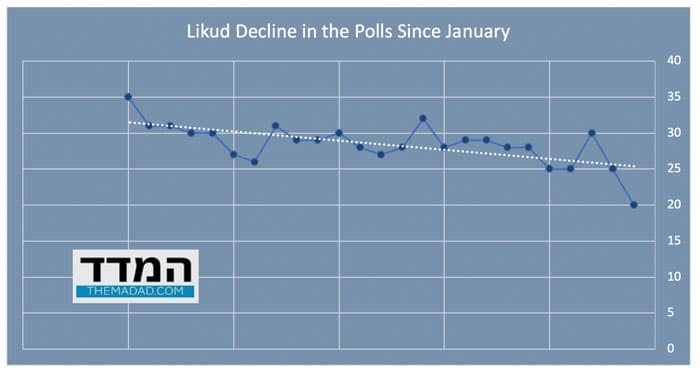
The question of causality is always complicated. In politics, it is even more complicated. Israel got its new government a little more than a 100 days ago. It is a government that made its presence noticeable. It is a government that had no intention to keep the status quo. It wanted a change. It pushed for a change.
The government’s opponents believed that the intended change is a little too much. They took to the streets. The government’s supporters believed that the intended change was necessary, even urgent. They backed the government’s effort. Just four weeks ago I wrote here that the decrease in the number of seats predicted for the coalition in the polls is not dramatic. The upheaval of legal reform, I wrote, does not fundamentally change the construct of the political blocs. “You can look at it in astonishment: how can it be that even such an event does not move the needle?,” I wrote.
Well – the needle finally moved. This was evident on Sunday, when a dramatic survey by Prof. Camil Fuchs gave a clear majority to the opposition. But it was also evident two days earlier, in a slightly less dramatic poll by Maariv, which tied the predicted number of seats for the Likud party and the party headed by Benny Gantz. In fact, in the last five polls by five different pollsters, the Likud’s average is 25 seats. A significant drop compared to its current situation (32). Add to the Likud decline a slight decrease in the projected vote for the Religious Zionism Party, and you get the new picture of Israel’s political map.
Why did it happen? The sequence of events points to Defense Minister Yoav Gallant’s speech, and his announced dismissal, as a key moment. An unstable security situation, that included recent rocket fire from Lebanon and Gaza, and a few deadly terror attacks, added urgency to an insult. Netanyahu looked as if he lost control of his coalition and of the country. Deciding to sack Galant for making a clear warning about the deteriorating situation made him look petty and vengeful, deciding to keep Galant “for now” made him look weak, and painted his initial decision as even more pathetic.
Then, there’s the rise of Benny Gantz, the leader who consistently stick to a clear message of moderation and compromise. Israelis who want quiet flock to him. Some of them switch from the Likud party, moving a little towards the center. Some of them move from Yesh Atid, abandoning the leader (Yair Lapid) who seems unable to decide if he wants a compromise or the perpetuation of the crisis. Quite a few former voters of Naftali Bennett and Ayelet Shaked, who gave the Religious Zionism party a chance, migrated to Gantz. The rise of his blend party — some right, some center-left, some conservative, some quite liberal — sends an important message to the other parties. On the practical-political level, it unites Netanyahu and Lapid, both of whom have an interest in preventing Gantz from becoming the natural candidate for prime minister. On the socio-ideological level, it signals that many Israelis are tired of unnecessary fights and want to restore a sense of harmony.
The agenda that gains supporters is the conciliatory agenda. The leader who has a chance to break the political tie is the leader of compromise.
The agenda that gains supporters is the conciliatory agenda. The leader who has a chance to break the political tie is the leader of compromise.
This is an important signal to those who currently sitting at the President’s House in search of a legal compromise. This is an important signal to the heads of the parties who wish to reign in their loud provocative mouthpieces. And it is also a signal to the protest movement. The agenda that gains supporters is the conciliatory agenda. The leader who has a chance to break the political tie is the leader of compromise.
Of course, one should look at long term trends and beware of overinterpretation of a few recent polls. This is what the Prime Minister is probably doing as he asks himself where to go from here. One option is to move with full force and try to pass the legal reform after the holidays, in a demonstration aimed at reuniting the right around a clear flag. A second option is to aim for a course of moderation. Maybe it’s time for the government to cut its long string of provocations (from religious legislation to the legal reform) and move to dealing with security, cost of living, transportation, crime – the boring stuff for which a government is usually elected.
The problem is that it will be quite easy for Netanyahu to implement the first option, which carries a great risk of social breakdown. It will be much more difficult for Netanyahu to implement the second option, mainly because some of his partners will not be enthusiastic about it.
Whatever he does, it seems that Netanyahu will have to make a clear choice between these two options, rather than something that is a little of this and a little of that, which, as is now evident, does not carry a political dividend, but rather weakens him and strengthens his opponents. In a way, the bleak polls could help him. One or two more of those, and even the last of the skeptics in his camp would agree that there’s a need for reform. Not a legal reform. A reform in the way this government operates. After 100 days, it’s time for a reset.
Something I wrote in Hebrew
ming to the White House any time soon: Those trying to understand Biden’s motives should take into account the missed connection. Americans got burned in recent years in a different-yet-similar processes that eroded their democratic system. They got burned when a former president refused to acknowledge his election defeat, and when his followers protested on Capitol Hill. This is important, because when Biden looks at Netanyahu’s Israel, he cannot avoid the connection to Trump’s Washington. This is of course not entirely fair, because Netanyahu is not Trump; Because what he wants to do here is not similar to what Trump wanted to do there; Because Israel is a different country, which operates in a different way. Still, the sensitivity of the establishment in the U.S. to harming democratic institutions is high. This impacts the way Biden interprets Israel.
A week’s numbers
See lefthand column for more details about this graph.

A reader’s response:
Al Rossman asks: “Do you think a war with Lebanon is imminent?”
My response: It’s possible, but not inescapable. Hezbollah is in a difficult situation within a country that goes through yet another crisis, so it’s not clear that a war with Israel is what they aim for.
Shmuel Rosner is senior political editor. For more analysis of Israeli and international politics, visit Rosner’s Domain at jewishjournal.com/rosnersdomain.


































 More news and opinions than at a Shabbat dinner, right in your inbox.
More news and opinions than at a Shabbat dinner, right in your inbox.